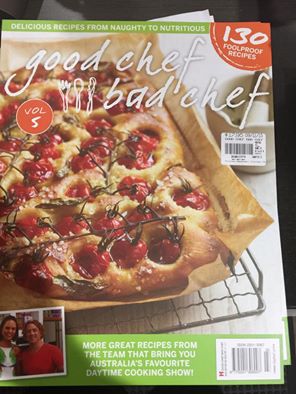Here are photos I have been sent by newsagents of magazines they received yesterday. The stickers on the covers are from other newsagencies where these magazines failed to sell.
Publishers ought to ensure we receive clean, fresh and merchantable stock.




This supply of old magazines seems to be happening on a regular basis, and we have to pay the labour cost of processing them and the cost of of freight to return them. How can a supplier continue to do this to newsagents?
It is a very unfair practice.
It is conduct like this that is forcing newsagents to reduce their range of magazines.
Gotch obviously deemed 5/5/16 second hand magazine day, though why as in my case they would choose to send a shed load of Good Chef Bad Chef #5 to a newsagent who failed to sell a single copy the first time round is beyond me.
I believe not so long ago the head honcho at Gotch was accusing newsagents of ignorance in relation to magazine management. If he wants to witness true ignorance I’d suggest a visit to his magazine allocation department and a good look around.
We received these as well.
They have been sent back. What a waste of resources by G&G.
Sent all mine back and for good measure early returned later issues of Good Chef Bad Chef … like Steve, this publication does not sell.
Maybe they will get the message … doubt it somehow
My understanding is this is a publisher issue. Gotch is effectively the trucking company.
Mark, it probably was CMMA’s decision to redistribute these titles but Gotch has to be responsible for the allocations. Gotch most likely also advised them on the size of the original print run which led to so much excess stock to redistributed.
At the end of the day I don’t care if the dog wags the tail or the tail wags the dog I just want them to keep their flees to themselves
Steve it all depends. Some publishers do their own allocations. I am not sure here.
Maybe Bauer has bought out Gotch, they’re just not disclosing it yet!!
I think it is an circulation issue. Circulation supports advertising rates. The mags are being recycled to achieve the numbers the advertising agencies are initially fed. This mag will fold soon for sure.
As the publisher of a niche title for 24 years, I believe I can shed some light on how this is happening.
Firstly, please remember those newsagents Mark often writes about who don’t use all the features in their management software, because some publishers aren’t perfect either.
Over the years I have been with all the major distributors. In each case, the publisher sets the print run and has the ability to determine the number of copies distributed (however to achieve the latter takes lots of business experience and additional hard work, as explained later).
Here’s how it goes.
The distributor devotes considerable energy trying to convince the publisher that they are the “sales experts”. Inexperienced publishers can easily fall for such a solid pitch.
The communication tool between distributor and publisher is a distributor-created spreadsheet comprising a variable number of information columns.
The basic spreadsheet contains the name and address of each retail outlet and the number of copies sold.
Note: NOT the number of copies supplied to each retail outlet, just the number sold.
If a publisher does not have a solid business background, it will take time before they realise they have to ask the distributor to also advise the number of copies supplied to each retail outlet (and other important details too).
The distributors also offer additional services, such as Full Copy Return, Return to Publisher, Storage of Returns, and Re-Distribution of Issue/s. For each of these services the distributor charges the publisher an additional fee.
In my experience, many publishers initially request Full Copy Return and Return to Publisher. Then, when sales revenue does not match what is expected, they change to Full Copy Return plus Storage of Returns and Re-Distribution of Issue/s (if bagging of multiple issues, an additional fee is charged).
As far as I know there is no “Small Publishers Group” which niche publishers can join and have all the ins and outs of magazine distribution fully explained to them. Nor, to my knowledge, is there a software program available to niche publishers that integrates with the program used by distributors to create their distribution/sales spreadsheets.
This means that as well as creating each issue of their publication and paying to have them distributed to newsagents, niche publishers must also spend many hours scrutinising and manually analysing hundreds of pages of hard copy spreadsheet for each issue of those beloved magazines. In other words, it takes blood, sweat and tears for niche publishers to calculate each and every print run.
Sadly, many don’t.
Not because they are evil or greedy.
Because they don’t know.
And because group support is not available.
And because the appropriate management software is not available.
And yes, it is unconscionable that newsagents are obligated to pay return freight for these unnecessarily re-distributed titles that don’t have a hope of selling.
In 2016, any suggestion of full copy returns of any title is ridiculous and archaic. The sooner publishers and distributors realise this the better.
Hi Shayne, I could not agree more, however when viewed through the eyes of a novice publisher, it initially seems sensible. Fact is, their first thought is print cost and the necessity of recouping that via sales.
That they have the ability to manage print costs by determining each and every print run comes later – after experience, comprehension and consideration. Not unlike real life, actually.